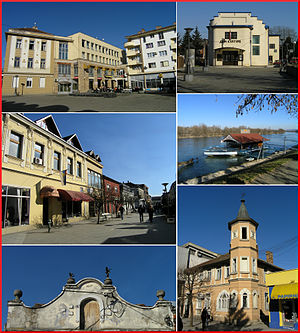Dubica, Bosnia and Herzegovina
| Kozarska Dubica Козарска Дубица |
||
|---|---|---|

Highlights of Kozarska Dubica
|
||
|
||
 Location of Dubica within Bosnia and Herzegovina |
||
| Coordinates: 45°11′N 16°48′E / 45.183°N 16.800°ECoordinates: 45°11′N 16°48′E / 45.183°N 16.800°E | ||
| Country |
|
|
| Government | ||
| • Mayor | Radenko Reljić (SNSD) | |
| Area | ||
| • Total | 499,01 km2 (19,267 sq mi) | |
| Elevation | 104 m (341 ft) | |
| Population (2013 census) | ||
| • Total | 23,074 | |
| • Density | 46,2/km2 (1,200/sq mi) | |
| Time zone | CET (UTC+1) | |
| • Summer (DST) | CEST (UTC+2) | |
| Area code(s) | 52 | |
Kozarska Dubica (Cyrillic: Козарска Дубица) is a town and municipality located in northern Bosnia and Herzegovina and is administratively part of the Republika Srpska entity. Dubica, for short, is situated in the eastern part of Bosanska Krajina region. The municipality of Hrvatska Dubica lies to the north, in Croatia. Dubica is situated 26 kilometres (16 miles) from the Zagreb–Belgrade Highway. The town and its suburbs border the Republic of Croatia to the north, the town of Gradiška to the east, the town of Kostajnica to the west, and the town of Prijedor to the south. The land area of Dubica is 499 square kilometres (193 sq mi) and the population is about 23,000 (2013 census).
The town was originally known as "Bosanska Dubica" (literally "Bosnian Dubica") but was renamed "Kozarska Dubica" (Козарска Дубица in Serbian Cyrillic) by the authorities of the Republika Srpska, following the Bosnian War, which was part of a broad political resolution to purge out all Bosnian prefixes on a territory of this Bosnian and Herzegovinian entity.
Dubica was built in 930. However, the first mentioning of Dubica dates from 1197. Babonići-Vodički were in charge of the town until the 12th century. Dubica became an important fort during the Ottoman Empire due to its geographic positioning. It became a vital and important border crossing for many years. The last Austrian-Turkish war was the so-called Dubica War (1788–91) and was fought in this area. During the war in Dubica in the 1780s, the town, which was described at the time as having only a few houses and a mosque, was completely razed. The town fell under Ottoman occupation in 1538. Bosanska Dubica encountered many different rulers during the Ottoman Empire and the later Austro-Hungarian Empire.
...
Wikipedia

